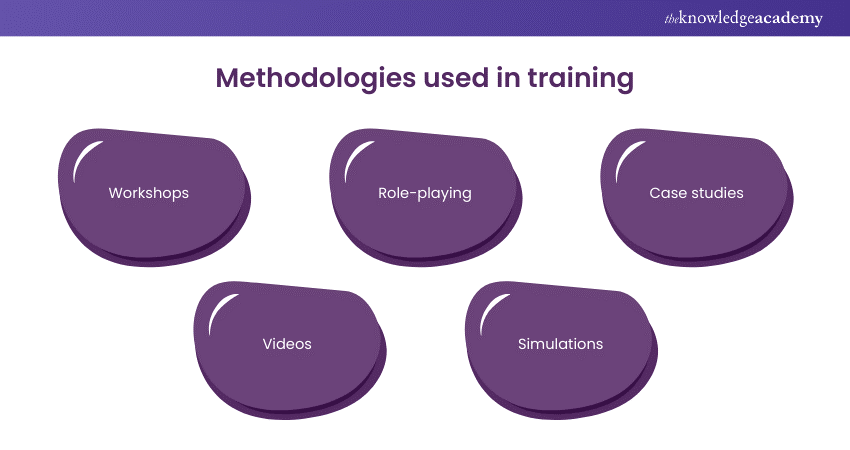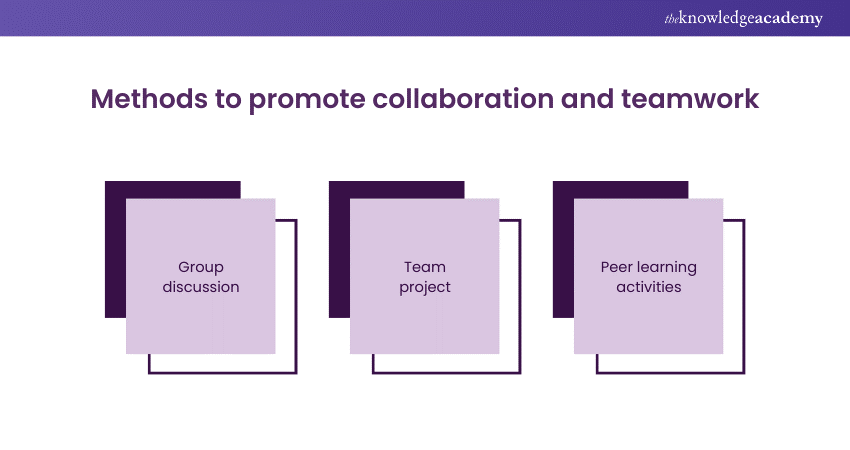We may not have the course you’re looking for. If you enquire or give us a call on +44 1344 203999 and speak to our training experts, we may still be able to help with your training requirements.
Training Outcomes Within Your Budget!
We ensure quality, budget-alignment, and timely delivery by our expert instructors.

Whether you're preparing for an interview to become a corporate trainer or seeking the best candidates for this role, this Top 15+ Corporate Trainer Interview Questions and Answers will equip you with essential insights. Below, we've compiled a list of the top 15+ interview questions commonly asked during corporate trainer interviews, along with answers and strategies for success.
Table of Contents
1) Subject Expertise and Teaching Methods
2) Personal Motivation and Professional Development
3) Training Delivery and Engagement
4) Training Needs Assessment and Evaluation
5) Conclusion
Subject Expertise and Teaching Methods for a Corporate Trainer
1) Which subject do you teach more often?
This question is typically asked in corporate trainer interviews to gauge the candidate's area of expertise and specialisation. The interviewer expects the candidate to provide insight into the specific topics or subjects they frequently teach during training sessions. By understanding the candidate's focus areas, the interviewer can assess whether their expertise aligns with the training needs of the organisation.
Sample answer:
“I primarily focus on leadership development in my training sessions. Leadership skills are vital for organisational success, and my expertise lies in cultivating effective communication, decision-making, and team management abilities. By emphasising leadership development, I empower individuals to drive positive change within their teams.”
2) What methodologies do you use in training?
The question assesses the candidate's understanding and adaptability in training delivery. It evaluates their ability to engage learners effectively, align methodologies with organisational goals, and stay in touch with innovative approaches.

Sample answer:
“In my training sessions, I employ a blend of interactive methods such as workshops, role-playing, and case studies, alongside multimedia elements like videos and simulations. This ensures engagement and caters to diverse learning styles while achieving desired learning outcomes effectively.”
Personal Motivation and Professional Development
3) How do you maintain your own motivation and enthusiasm as a Corporate Trainer? What strategies do you employ to stay energised and engaged in your role?
The question evaluates the candidate's self-awareness, passion for training, and ability to sustain motivation in a demanding role. It also assesses coping mechanisms for challenges and alignment with organisational culture, fostering continuous improvement.
Sample answer:
“To maintain my motivation, I prioritise professional development through attending workshops, networking with peers, and staying updated on industry trends. Engaging with success stories of past trainees and incorporating varied teaching methods also keeps me energised, ensuring I deliver impactful training sessions consistently.”
4) How do you keep up with news and trends in employee training?
The question assesses the candidate's commitment to staying informed about industry advancements and emerging trends in employee training. It evaluates their ability to adapt methodologies, promote innovation, and ensure training programs remain relevant and effective in evolving workplaces.
Sample answer:
“I stay current by reading industry publications, attending workshops, and networking with peers. This helps me incorporate the latest trends and best practices into my training programs, ensuring they remain effective and relevant.”
Disseminate knowledge and sharpen your active listening skills by signing up for our Train the Trainer Course now!
Training Delivery and Engagement
5) How would you conclude a training session?
The question is to check the candidate's ability to draw the most important lessons and bring motivation for the participants at the end of training sessions. It assesses the organisers' competence in summarising the content, gathering feedback as well as formulating key takeaways for participants to adopt.
Sample answer:
“To conclude a training session, I typically summarise key points, review objectives, and invite participants to share their insights. I encourage feedback to assess the session's effectiveness and address any remaining questions. Finally, I provide actionable takeaways for participants to apply in their roles, ensuring practical application of the learning material.”
6) Can you give an example of how you have motivated and engaged learners in the past?
This question evaluates the candidate's ability to identify specific examples of how they have motivated and engaged learners in previous sessions via training. It evaluates their hands-on application, imagination, and the ability to sustain learners' involvement through motivational methods.
Sample answer:
“During sales training, I implemented interactive activities and team challenges to foster engagement. This led to increased participation and skill application, resulting in improved performance and exceeding sales targets.”
7) Share an experience where you had to deliver training remotely or through virtual platforms. How did you ensure effective communication and engagement with the participants?
The question judges the candidate on the experience in the delivery of remote training and the strategies for communication and engagement. It evaluates flexibility, communication skills and ability to work virtually.
Sample answer:
“In a virtual sales training, I utilised interactive tools like polls and breakout rooms, coupled with clear communication and frequent check-ins, to maintain engagement effectively.”
8) How would you describe your approach to building rapport and establishing a positive relationship with training participants?
This question focuses on candidate's way of building trust and relationships with training participants. It evaluates interpersonal skills, communication style, and empathy which are essential to develop a learning atmosphere conducive to learning, involvement, and knowledge transfer.
Sample answer:
“I prioritise active listening, empathy, and acknowledging diverse perspectives to foster open communication and create a supportive atmosphere. This approach enhances engagement and learning outcomes during training sessions.”
Get familiarised with effective coaching by signing up for our Coaching Skills Course now!
9) How do you handle unexpected challenges or disruptions during a training session? Can you provide an example of a time when you effectively managed such a situation?
The question checks the candidate’s capacity to handle unexpected obstacles encountered while training. It looks for illustrations of successful problem-solving and adaptability, which are significant to keep the sessions going and the participants engaged.
Sample answer:
“During a technical issue in a virtual training, I maintained composure, communicated updates transparently, and provided alternative activities to keep participants engaged until the issue was resolved promptly.”
10) How do you create a positive and inclusive learning environment for participants from diverse backgrounds or with differing perspectives?
The question is assessing whether the candidate can effectively promote inclusiveness and diversity through training. It evaluates the approaches that promote respect, understanding, and commitment of all participants regardless of their background and views to enrich their learning experience.
Sample answer:
“I cultivate inclusivity by valuing diverse perspectives, fostering open dialogue, and incorporating varied teaching methods. Encouraging mutual respect and active participation creates an environment where every participant feels valued and empowered in their learning journey.”
11) How do you promote collaboration and teamwork among learners?
This question focuses on evaluating the candidate's effectiveness of collaboration and teamwork skills, while training. It aims to implement techniques for facilitating the engagement of learners, promoting peer support, and harnessing the strengths of the group for enhancing learning outcomes through the sharing of knowledge, and combined problem-solving approaches.

Sample answer:
“I promote collaboration by facilitating group discussions, team projects, and peer learning activities. Appreciating active participation and fostering a supportive environment allows learners to leverage each other's strengths and achieve shared goals.”
12) Can you describe a situation where you had to adapt your training style to better suit a specific individual or team?
The question is to assess the competency and reactivity of the candidate in the regard of the different learning needs. It shows how specific training methods can be adapted to accommodate personal or team preferences, underlines the approach's ability to be flexible and maximise learning outcomes for all participants.
Sample answer:
“I adapted training content for a diverse team by offering both basic and advanced material. Interactive activities and supplementary resources accommodated various learning speeds, ensuring comprehensive understanding for all participants.”
Training Needs Assessment and Evaluation
13) If I asked you to identify the training needs of the organisation, where would you start?
The question gauges the candidate's method for pinpointing organisational training needs. It seeks insight into their approach, considering factors like employee feedback, performance data, and strategic goals to ensure targeted and effective training initiatives.
Sample answer:
“If tasked with identifying training needs, I'd start by gathering employee feedback, analysing performance data, and aligning training goals with organisational objectives. This ensures targeted and effective training initiatives that address specific areas for improvement.”
Ready to level up your skills and unlock your full potential? Enroll now in our Mentoring Training Course and embark on a transformative learning journey!
14) Give me an example of how you use technology in your job. What e-learning software do you prefer?
The question evaluates the candidate's use of technology in training and their preferred e-learning software. It assesses their adaptability, technical proficiency, and alignment with organisational technology preferences, ensuring effective training delivery.
Sample answer:
“I use platforms like Zoom for virtual training and tools like Articulate Storyline for e-learning modules. This ensures engaging and effective knowledge transfer in diverse learning environments.”
15) Can you share an example of a successful training initiative you led? How did you measure its impact on the organisation and its employees?
The question assesses the candidate's ability to plan and evaluate training initiatives effectively. It seeks specific examples of successful training programs led by the candidate and how they measured their impact on both organisational outcomes and employee performance.
Sample answer:
“I led a customer service training program focusing on active listening and problem-solving skills. Post-training surveys showed a significant increase in customer satisfaction scores, indicating improved employee performance and organisational success.”
16) When should you use skill assessments in your hiring process for Corporate Trainer?
The question assesses the candidate's grasp of the appropriate timing for incorporating skill assessments into the hiring process for corporate trainers to ensure alignment with organisational needs and objectives.
Sample answer:
“I would add skill assessment skills right at the start when hiring corporate trainers. It's like the first step to make sure they've got what it takes to train the team and meet the company's goals.”
17) Can you describe a situation where you had to adapt your training style to better suit a specific individual or team?
The question assesses the candidate's flexibility in tailoring training approaches to meet diverse learning needs. It seeks examples of adapting training styles to accommodate individual or team preferences effectively.
Sample answer:
“I tailored training for a team with diverse experience by mixing basic and advanced content, utilising interactive activities, and providing extra resources for individual pace.”
Conclusion
Effective corporate trainers play a pivotal role in driving organisational success by fostering professional development and enhancing employee skills. By mastering these H1 Top 15+ Corporate Trainer Interview Questions and Answers and demonstrating their expertise, candidates can showcase their ability to deliver impactful training programs that meet organisational needs and drive positive outcomes.
Ready to enhance your leadership skills? Enroll in our Coaching and Mentoring Training Course today!
Frequently Asked Questions
Upcoming Business Skills Resources Batches & Dates
Date
 Train the Trainer
Train the Trainer
Fri 17th Jan 2025
Fri 21st Feb 2025
Fri 4th Apr 2025
Fri 6th Jun 2025
Fri 29th Aug 2025
Fri 24th Oct 2025
Fri 26th Dec 2025







 Top Rated Course
Top Rated Course



 If you wish to make any changes to your course, please
If you wish to make any changes to your course, please


